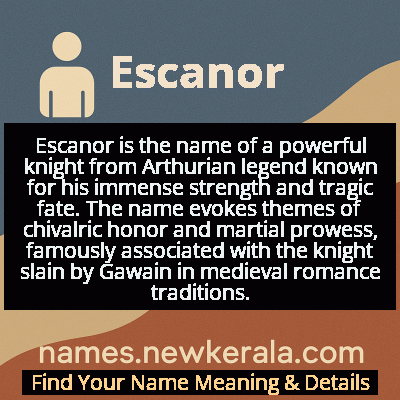Escanor Name Meaning & Details
Origin, Popularity, Numerology Analysis & Name Meaning of Escanor
Discover the origin, meaning, and cultural significance of the name ESCANOR. Delve into its historical roots and explore the lasting impact it has had on communities and traditions.
Name
Escanor
Gender
Male
Origin
Arthurian
Lucky Number
3
Meaning of the Name - Escanor
Escanor is the name of a powerful knight from Arthurian legend known for his immense strength and tragic fate. The name evokes themes of chivalric honor and martial prowess, famously associated with the knight slain by Gawain in medieval romance traditions.
Escanor - Complete Numerology Analysis
Your Numerology Number
Based on Pythagorean Numerology System
Ruling Planet
Jupiter
Positive Nature
Optimistic, inspirational, and creative.
Negative Traits
Scattered, exaggerating.
Lucky Colours
Yellow, gold, purple.
Lucky Days
Thursday.
Lucky Stones
Yellow sapphire.
Harmony Numbers
1, 2, 9.
Best Suited Professions
Arts, writing, communication.
What People Like About You
Creativity, optimism.
Famous People Named Escanor
Escanor the Strong
Arthurian Knight
Legendary knight known for his immense strength and tragic death at Gawain's hands
Escanor of the White Mountain
Literary Character
Prominent knight in French Arthurian romances, particularly in the Prose Tristan
Escanor de la Montagne
Literary Knight
French version of the character appearing in various chivalric romances
Name Variations & International Equivalents
Click on blue names to explore their detailed meanings. Gray names with will be available soon.
Cultural & Historical Significance
The character's cultural significance extends beyond his individual story to represent the archetype of the 'doomed knight'—a figure whose very virtues lead to his destruction. Escanor's legacy in medieval literature demonstrates how Arthurian authors used secondary characters to explore the moral complexities of knighthood and the inevitable consequences of rigid adherence to honor codes. His continued presence in Arthurian scholarship and adaptations ensures that this minor but meaningful character remains part of the enduring cultural conversation about medieval chivalry and its modern interpretations.
Extended Personality Analysis
Escanor's personality, as depicted in Arthurian literature, embodies the quintessential traits of the medieval knight—courage, strength, and unwavering commitment to his code of honor. He is characterized by his immense physical power, which serves as both his greatest asset and potential liability, often leading him into conflicts where brute force cannot resolve underlying complexities. His steadfast adherence to principles suggests a personality marked by conviction and moral certainty, though this rigidity may have contributed to the circumstances leading to his fatal encounter with Gawain.
Beyond his martial qualities, Escanor likely possessed the courtly virtues expected of Arthurian knights, including loyalty to his liege and comrades, though the specific details of his character vary across different literary traditions. The tragic nature of his story implies a certain nobility of spirit combined with perhaps a lack of diplomatic flexibility—a common theme among Arthurian knights whose strengths become their weaknesses. This combination of physical might, honor-bound determination, and tragic flaw makes Escanor a compelling representation of the complex moral landscape that defined Arthurian chivalry and the knights who embodied it.
Modern Usage & Popularity
In contemporary contexts, Escanor remains an exceptionally rare given name, primarily confined to academic discussions of Arthurian literature and specialized interest communities. Its modern usage is almost exclusively found among Arthurian enthusiasts, historical reenactors, and parents seeking distinctive names with medieval literary connections. The name has experienced minimal mainstream adoption, though it occasionally appears in fantasy literature and gaming communities that draw inspiration from Arthurian themes. Current naming trends show that when used, Escanor is typically chosen by parents with strong interests in medieval history or Arthurian legend, often as a middle name rather than a first name. Its rarity ensures that bearers of the name maintain a unique connection to literary history, though its association with a tragic character may limit its broader appeal.
Symbolic & Spiritual Meanings
Escanor symbolizes the archetypal tragic knight whose very virtues become instruments of his downfall, representing the complex relationship between strength, honor, and destiny in Arthurian cosmology. His character serves as a metaphor for the limitations of physical power when divorced from wisdom and flexibility, embodying the Arthurian theme that even the mightiest warriors cannot escape the consequences of their choices and the inexorable workings of fate. The name evokes the poignant reality that noble qualities, when taken to extremes or applied without nuance, can lead to destruction rather than victory.
More broadly, Escanor represents the inevitable conflicts that arise within any system of honor, where different interpretations of chivalric duty can pit virtuous individuals against one another. His story symbolizes how the Arthurian ideal of knighthood contained within itself the seeds of its own dissolution, as uncompromising adherence to principle could create irreconcilable divisions even among the most honorable men. This symbolic weight makes Escanor an enduring figure in the Arthurian tradition, reminding us that strength and virtue alone cannot guarantee harmony or survival.

